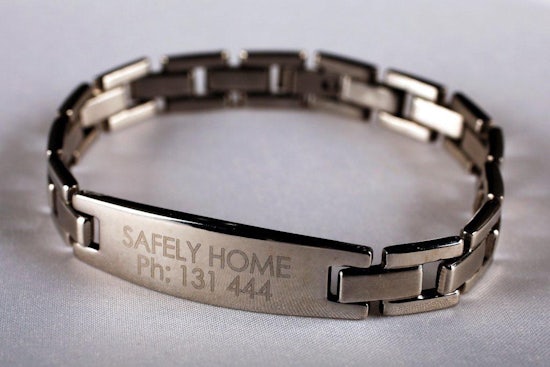‘Safely Home’ Program wins Award for Excellence
A program to help prevent people living with dementia from going missing has won the Queensland Police Service (QPS) Award for Excellence.

The Safely Home program has won the Queensland Police Service Award for Excellence.
Safely Home, a joint QPS and Alzheimer’s Australia (Qld) initiative, has helped vital statewide registrations of people living with dementia and improved operational capabilities for police.
Launched in April this year, Safely Home registration of people living with dementia, encourages individuals to provide medical and personal details, which are then logged in-confidence within a QPS database. A Safely Home identifying bracelet is then assigned, making it easy to ascertain who a person is if found to be wandering, looking lost or disoriented.
“The Safely Home initiative is a project that is focused on helping prevent those people in our community living with dementia from becoming one of the many people reported missing each year.
“I congratulate the project team from our Missing Persons Unit and the team from Alzheimer’s Australia Queensland for their dedication to this initiative and on receiving the bronze award at this morning’s Awards for Excellence ceremony,” Acting Assistant Commissioner Cameron Harsley says.
Alzheimer’s Australia (Qld) CEO, Victoria Beedle is ecstatic with the enthusiasm shown by those people living with dementia, their family members and carers towards the Safely Home initiative.
“Successful implementation of the Safely Home program in April was made possible through ongoing consultation and the absolute support of all stakeholders, including invaluable financial provision by Lowood Slimmers,” says Ms Beedle.
“The unwavering commitment of the Queensland Police Service has provided added reassurance among all local communities living with dementia.
“There are so many benefits to be gained through registration within the Safely Home program. An individual’s confidence may be enhanced, plus members of a community can assist in identifying a person by their bracelet and have immediate access to the toll-free PoliceLink number.
“It is our continued hope that the Safely Home initiative will help to do just that – to bring Queenslanders with dementia safely home,” Ms Beedle says.
The QPS Awards for Excellence acknowledge and reward individuals and teams for innovative, creative and outstanding initiatives, projects or systems that have been implemented across the state.
Wandering is quite common amongst people with dementia, who have an increased risk of becoming a missing person. QPS says on average, there are 18 new reports of missing persons across Queensland every day. Of the 6,700 cases each year, over 300 are older persons or people living with dementia.
The Safely Home bracelet is engraved with a unique identifying code, which links directly to a database accessible by police at all times from any location. It is also engraved with the PoliceLink telephone number. The bracelets are available at no cost to people with a diagnosis of dementia through Alzheimer’s Australia (Qld.
To register for the Safely Home program, or to find out more information, call the National Dementia Helpline on 1800 100 500.











![The new Aged Care Act exposure draft is slated for release in December of 2023, but advocates hope to see it rolled out on January 1, 2024. [Source: Shutterstock]](https://agedcareguide-assets.imgix.net/news/articles/wp/agedcareact__0811.jpg?fm=pjpg&w=520&format=auto&q=65)












Comments